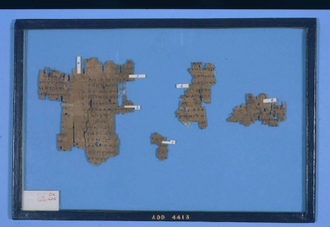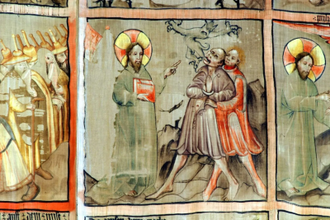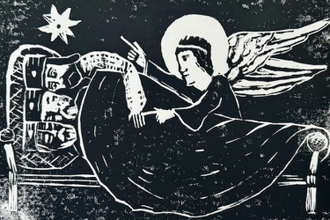Gospel in Art: Saint Irenaeus, Bishop, Doctor and Martyr

Cambridge University library manuscript 4113, Papyrus Oxyrhynchus 405, Irenaeus Circa 200 AD © Cambridge University Library, all rights reserved
Source: Christian Art
Gospel of 28 June 2025
John 17:20-26
At that time: Jesus lifted up his eyes to heaven, and praying said, '[Holy Father,] I do not ask for these only, but also for those who will believe in me through their word, that they may all be one, just as you, Father, are in me, and I in you, that they also may be in us, so that the world may believe that you have sent me. The glory that you have given me I have given to them, that they may be one even as we are one, I in them and you in me, that they may become perfectly one, so that the world may know that you sent me and loved them even as you loved me. Father, I desire that they also, whom you have given me, may be with me where I am, to see my glory that you have given me because you loved me before the foundation of the world. O righteous Father, even though the world does not know you, I know you, and these know that you have sent me. I made known to them your name, and I will continue to make it known, that the love with which you have loved me may be in them, and I in them.'
Reflection on the Manuscript Fragment
Today we celebrate the feast of Saint Irenaeus, one of the most significant theologians of the early Church. Born around 130 AD in Smyrna (modern-day Izmir, Turkey), Irenaeus was a disciple of Saint Polycarp, who in turn had been a disciple of the Apostle John. This placed Irenaeus in a direct line of tradition stretching back to the very Apostles. Around 177 AD, he became the Bishop of Lyon in France, where he served both as a pastor and a theological defender of the Christian faith.
Irenaeus is best known for his seminal work, Adversus Haereses (Against Heresies), written around 180 AD. This five-volume treatise systematically confronted Gnosticism, a popular and dangerous heretical movement that claimed salvation came through secret knowledge and regarded the material world as inherently evil. In response, Irenaeus vigorously defended the goodness of creation, the unity of God in both the Old and New Testaments, and the full humanity and divinity of Jesus Christ. His work was instrumental in affirming core Christian teachings at a time when the young Church faced deep doctrinal confusion.
Cambridge University Library Manuscript 4113, also known as Papyrus Oxyrhynchus 405 (P. Oxy. 405), is a significant fragment of early Christian literature dating to around 200 CE. This papyrus contains a portion of Book III, Chapter 9, Section 3 of Against Heresies (Adversus Haereses), authored by Saint Irenaeus of Lyon circa 180 CE. Discovered in the ancient Egyptian city of Oxyrhynchus by archaeologists Bernard Grenfell and Arthur Hunt in the early 20th century, the fragment is preserved at Cambridge University Library. Written in Koine Greek, it offers a rare glimpse into the original language of Irenaeus's work, which predominantly survives in later Latin translations.
Notably, P. Oxy. 405 includes one of the earliest known quotations of the New Testament, specifically Matthew 3:16-17, where the voice from heaven declares, "You are my beloved Son; with you I am well pleased." This passage is marked in the manuscript's margins with wedge-shaped symbols known as diplai, indicating its scriptural significance. Scholars have observed that the handwriting is of a professional quality, suggesting it was produced by a skilled scribe. Given its close temporal proximity to the original composition, some experts have speculated that it could be a first- or second-generation copy, possibly even penned under Irenaeus's supervision. The fragment underscores the rapid dissemination and authoritative status of Irenaeus's theological arguments against Gnosticism in the early Church.
LINKS
Gospel in Art: https://christian.art/
Today's Reflection: https://christian.art/daily-gospel-reading/john-17-20-26-2025-3/ (with audio)


















